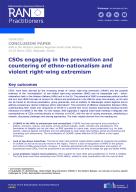Details
- Publication date
- 8 August 2022
- Author
- Directorate-General for Migration and Home Affairs
- Country
- Serbia
Description
CSOs have been alarmed by the increasing threat of violent right-wing extremism (VRWE) and the possible evolution of the “normalisation” of non-violent right-wing extremism (RWE) and its inseparable trait - ethnonationalism both in the Western Balkans (WBs) and in the EU. The potential of RWE to exacerbate political conflict and turn into VRWE has been of concern for citizens and practitioners in the WBs for some time already, as its roots can be traced to structural polarisation, group grievances, and an inability to disentangle violent legacies and to address exclusionary clerical (religious) ethno-nationalism.
The promotion of effective cooperation between CSOs, understanding their needs and viewpoints on P/CVE is a pivotal first move towards extensively tackling harmful influences of (V)RWE in the WBs. For this reason, RAN organised a regional small-scale meeting in Belgrade with representatives of CSOs working directly or indirectly on P/CVE, with the aim of raising awareness, establishing a network, discussing challenges and sharing approaches.
The main insights derived from the meeting are:
• (V)RWE in the WBs is mainstream and normalised. (V)RWE has been pervasive and prevailing in politics, economy, culture, and sports, among ordinary people, youth, scholars and practitioners. The boundaries of illegality are not yet clear, so RWE operates in a grey area, rarely prosecuted (e.g. for hate speech, violence against minorities) and not addressed by clear state interventions aimed at preventing and countering such phenomena. The normalisation of (V)RWE makes effective P/CVE efforts in the region strenuous.
• Lack of top-down incentives. The lack of clear interventions makes states unable to recognise the problem of (V)RWE as well as its security threat in the region. There is a lack of recognition of VRWE in the policies and actions of WBs governments. However, if carefully approached with the coordination and support of experienced local CSOs, first-line practitioners and governments can help to bridge the gap and tackle VRWE.
• Local problems require local solutions. More support for local CSOs and practitioners in P/CVE is needed. The local level must have ownership over P/CVE efforts, indeed in close coordination with the central level. Practitioners should be identified and enrolled in prevention training; individuals, groups and communities vulnerable to (V)RWE ideology should be carefully detected and targeted with preventive activities.

